Where Does Japan Stand In Its Approach To Women Rights in 2019?
Taking a Look at the Good, the Bad, and the Ugly Realities Women Face
As Japan has just begun a new era, we look into where women currently stand. In many aspects, the country has come a long way on the road to gender equality. In others, not so much.
Japan has a history of strong, groundbreaking women. In 594 AD, Empress Suiko, ruler of Japan, ordered the spread of Buddhism across the nation. Her pioneering efforts created practices still ubiquitous to this day, allowing her legendary legacy to prevail for over a thousand years. The first novel ever, The Tale of Genji, was written by Murasaki Shikibu, a lady-in-waiting at the Imperial court during the 11th century. Female samurai warriors known as onna-bugeisha rode into battle alongside men during Japan’s feudal period. Feminist movements have been around since at least the Meiji Era. Murasaki, legendary Empress Jingu, female author Ichiyo Higuchi (and as of 2024, Umeko Tsuda, a pioneer in women’s education), all appear on Japanese banknotes (we all know not a single woman is portrayed on U.S. currency.) The list of achievements goes on.
Meanwhile, in 2019, women in Japan are still forbidden from ascending the throne—significantly shrinking the number of possible heirs for an already depleted line. The 2018 World Economic Forum’s annual gender equality report ranked Japan 110th out of 144 countries, while in the political empowerment category, Japan ranked even lower at 125th.
What happened, Japan?
One can fairly enough argue that it’s not all that grim. Yes, strides are being made. Yet there are plenty of policies the country could drastically improve. Here we look at the good, the bad, and the ugly realities of women’s rights in contemporary Japan.
The Good: Women are speaking up and their words are affecting the law
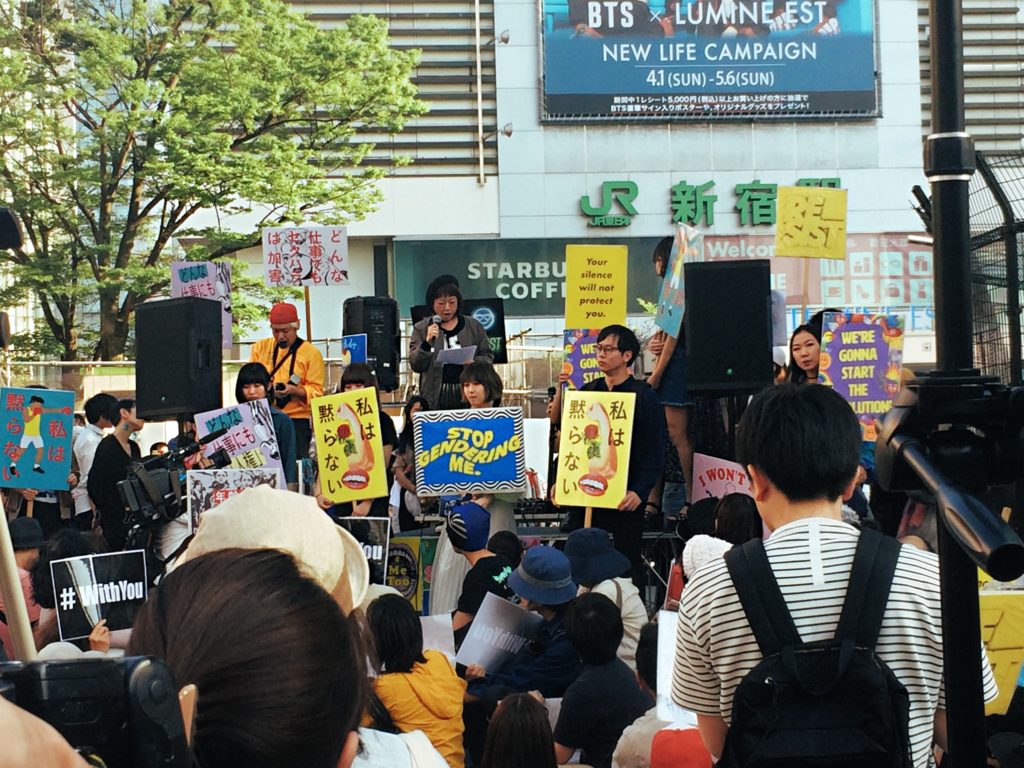
Over 100 of women (and men) took it to the streets of Shinjuku in the middle of Golden Week 2018 to start their own #metoo movement: #WithYou, insisting that sexual harassment is power harassment. Photo by Victoria Vlisides.
In 2017, the Japanese penal code underwent a much-needed update. The definition of rape was expanded to include oral and anal sex in addition to vaginal, allowing more victims, including men and boys, to seek justice. Sentences were also lengthened for the offender—before there was a longer minimum sentence for theft than there was for rape.
A number of factors influenced this change, but one of the most crucial ones was the public voice. Japanese women, non-binary folks, and men are increasingly bringing national attention to issues usually not talked about. A culture of silence characterizes Japan on many fronts, yet women and their supporters are rejecting that narrative by speaking out about sexual offenses and other gender-based harassment.
Japanese women, non-binary folks, and men are increasingly bringing national attention to issues usually not talked about.
Japan’s Secret Shame,* a documentary about Shiori Ito, a journalist who shocked the nation by publicly speaking out about her rape in 2017, details the current state of how Japan handles cases of sexual violence. When police refused to arrest the man she charged—Noriyuki Yamaguchi, a former Washington, D.C. bureau chief for TBS and a man with close ties to Prime Minister Abe—despite the wealth of evidence against him, Ito held a press conference to publicly accuse Yamaguchi and unveil the case. Her unprecedented move prompted many men and women to rally against her, calling her names and even sending death threats. But her actions also sparked a dialogue about the unfair and often traumatizing treatment of rape victims in Japan.
Ito’s memoir Black Box certainly did not become a bestseller in Japan, but the documentary about her case—as well as her continuous exposure in the media—served as evidence that Ito and others like her aren’t giving up on changing Japan. As a result, more and more powerful, outspoken women and campaigns for gender equality are emerging here.
Movements like #MeToo (plus variations such as #WeToo) and Voice Up Japan are slowly, but steadily gaining steam and support and most importantly—they are sending the message that Japan’s young generation does not longer accept silence as a norm.
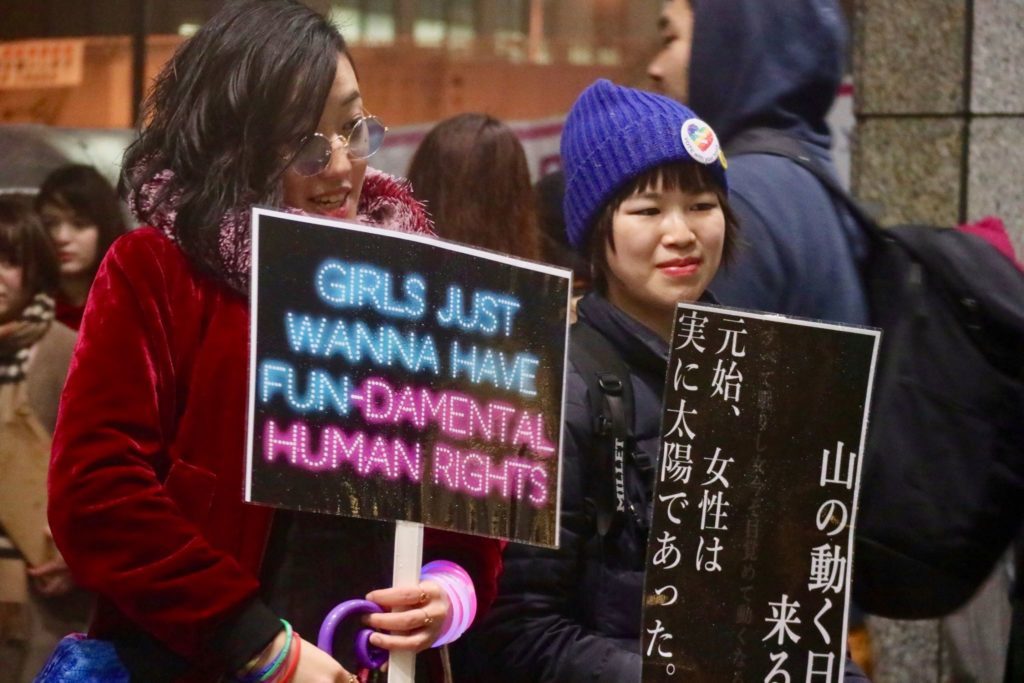
Women attend Tokyo’s second annual Women’s March in March, 2018. Photo: Alexandra Homma
The Bad: More women are joining the workforce, but rarely advancing beyond entry-level positions
With a record 69.6% of women between 15 and 64 holding jobs according to a national survey by Japan’s Internal Affairs Ministry for 2018, the female employment rate in Japan is higher than the U.S. population of working women. Yet even as women join the workforce in record numbers, the number of managerial positions they occupy is still scarce. Furthermore, their burden back at home, including housework and child-rearing, is not necessarily declining, despite being employed.

Japanese receptionists working for a giant domestic corporation.
In 2018, the Ministry of Internal Affairs and Communications further revealed that 56.1% of employed women have only part-time jobs or entry-level positions (22% of men by comparison). This is partially due to a tax deduction that benefits married couples if one person makes less than ¥1.5 million (about $13,000) a year—that person doesn’t have to pay income taxes and could be claimed as a dependent on their spouse’s tax return. A 2015 New York Times article claimed that Japanese women who do work full-time are promoted to leadership positions less often than men. According to Teikoku Databank Ltd., in 2018, only 7.8% of company presidents were female and 5% of senior roles (like CEOs, managing directors, and chairs) belonged to women. A Reuters Corporate Survey, conducted at the end of 2018, found that only one-tenth of Japanese businesses could claim women accounted for 10 percent or more of management.
Meanwhile, Prime Minister Abe’s “Womenomics” initiative to get more women into leadership positions by 2020 is failing. In his own sector, women make up a fraction of political figures—there is currently only a single woman serving in the Prime Minister’s cabinet, Satsuki Katayama, who was, of course, appointed as the Minister of State for Gender Equality and Minister in charge of Women’s Empowerment (among other duties).
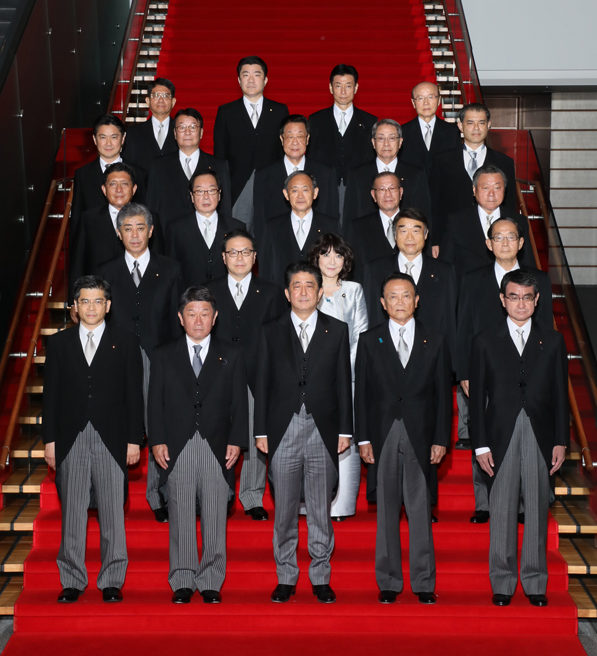
Ms. Lonely: Satsuki Katayama is the only woman in PM Shinzo Abe’s current cabinet.
According to the latest data of 2014, 46.9% of Japanese women still quit their jobs once they give birth to their first child. Those who do continue to work frequently end up with double if not triple the duties thanks to social norms that continue to view women as homemakers and caretakers. In a typical heterosexual marriage, women still do most of the chores and take care of the kids. This is often on top of having a career of her own—assuming she is able to return to work after having children. Working women are under intense pressure to balance their domestic and child-rearing roles with the demands of their jobs and mandatory after-work social events.
The Ugly: Harassment, abuse, and assault happen more frequently than we know
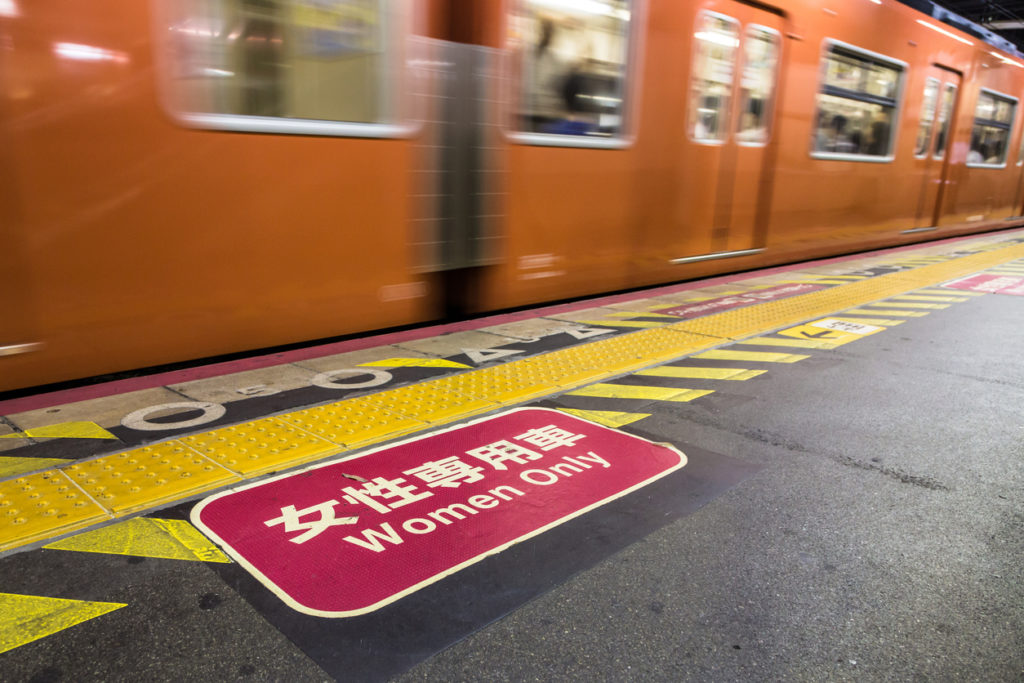
“Women’s Only” train cars were officially introduced in Japan in their current form in 2001 as a way to prevent increasing groping incidents.
Japan is a safe and peaceful place, where crime is rare and convictions even rarer. Government statistics from 2012 stated that 1 in 15 women in Japan report being assaulted during their lifetimes, a relatively low number internationally. But this security is partially an illusion. According to the same government survey, 95% of victims of rape and sexual assault decide not to report an attack to the police at all.
Such crimes are severely underreported thanks to the local culture of silence, as well as the difficulty in proving sexual harassment occurred at all. Lack of victim support and potential secondary victimization through excessive police interrogation are just two of the factors that discourage many victims from saying anything at all. Victims are often forced to reenact their assaults using life-sized dolls, further traumatizing and degrading them.
Victim blaming is pervasive in Japan. If a victim speaks out about an assault, they are often threatened, rather than the perpetrator, as discussed in the aforementioned case of Shiori Ito. In January, Maho Yamaguchi, a now former member of J-pop group NGT48, apologized to her fans. The reason? For making the public worry about her assault, which she Tweeted about after being attacked outside her own home by two men.
まほほん号泣配信 1/2 pic.twitter.com/ob1xlohj4z
— (/ω\) (@korokoromilky) January 8, 2019
This attitude is further evident in how Japan treats its infamous groping problem on public transit—solutions include the creation of “Women’s Only” cars and the manufacturing of cute badges women can pin to themselves that say things like “Don’t touch me!” By placing the onus on women to go out of their way by moving to a segregated train car or seeking out and wearing these pins rather than educating would-be gropers that their behavior is unacceptable, victim blaming can continue to prevail.
95% of victims of rape and sexual assault [in Japan] decide not to report an attack to the police at all.
For rape victims, the reality is even worse. Though the definition of rape was expanded upon recently as mentioned above, it still claims that “violence and intimidation” must be involved, which is a difficult thing to prove. Assailants who coerce a victim who is intoxicated or who take advantage of a lopsided power dynamic are unlikely to be tried. The idea that a lack of consent is what constitutes rape has yet to catch on.

Yareru gyaranomi: The tabloid magazine Shukan Spa! released an article in December 2018 ranking universities where female students are “easy to get in bed with” at drinking parties.
The way sex is taught and depicted in Japan has a damaging effect as well. Sex education is minimal, submissive and coercive sex is the norm in Japanese pornography, and situations that would definitely be defined as rape in some countries—date rape, for instance—aren’t considered such in Japan due to the continued ambiguity of the law. Furthermore, the age of consent remains staggeringly young at 13. Issues like stalking, domestic violence, and maternity harassment are also rampant.
Bringing attention to discrimination and other social problems is the first step to eradicating them. By continuing to speak out, Japanese women and their allies can ensure Japan is as safe and progressive for people of all genders as it claims to be. We are witnessing the seeds being planted. Now it’s time that all of us, nationals and foreigners living here, start contributing in every way possible to see the plants of the future grow.
*If you’re in Tokyo on May 30, 2019, TELL Japan will be screening Japan’s Secret Shame at Aoyama Gakuin University. For more details, see here.














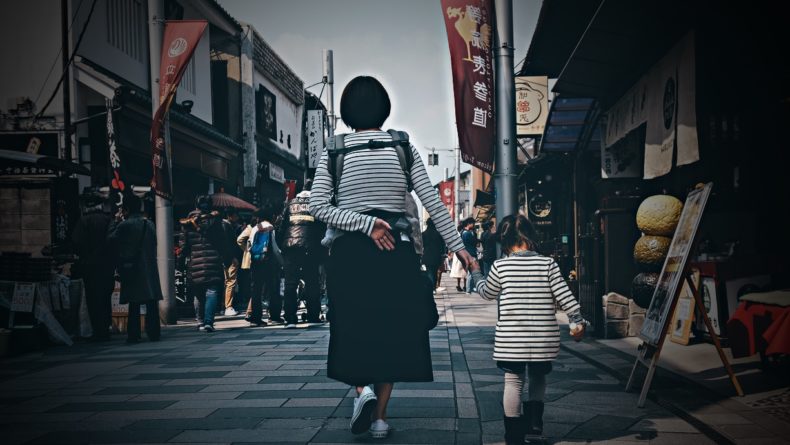

Leave a Reply